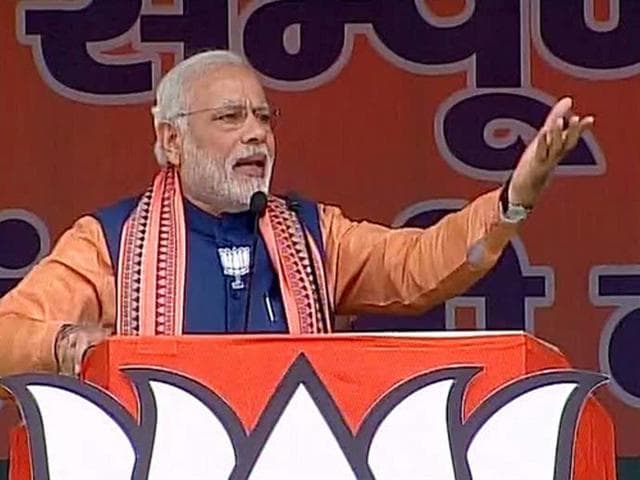Delhi referendum on PM Narendra Modi? Yes, no and maybe
As the BJP takes a beating in Delhi assembly election, a question that is being asked: "Was it a referendum on Narendra Modi?”
The Aam Admi Party (AAP)'s landslide victory in Delhi led to the inevitable question: Is the vote a referendum on Narendra Modi?

The answer, obviously, varied on either side of the political divide. The BJP, expectedly, was in denial mode. Though bruised and routed, the Congress seemed to take solace from what Trinamool Congress chief and West Bengal Chief Minister termed as a "turning point' in the country's politics.
Opposition parties would obviously like to believe Delhi has finally halted the Modi juggernaut as the national capital reflects the country's mood. The truth seems to lie somewhere in-between though.
Although the BJP projected Kiran Bedi as its chief ministerial candidate, the party wove its campaign narrative around Modi. It was evident from the domineering presence of the Prime Minister on the BJP's posters and advertisements and even in senior leaders' election speeches.
When the party exhorted voters to choose between anarchy and governance, it was certainly not projecting Bedi's track record as an IPS officer.
And yet, calling it a referendum on Modi could be fallacious, notwithstanding the BJP's disastrous showing. While Modi could be a catalytic agent, local factors determine local elections. Could Bedi match the personality cult of Arvind Kejriwal in Delhi? Could her personality, even though endorsed by Modi, make up for the disunity in the Delhi BJP? No wonder the BJP sought to make it a Modi versus Kejriwal contest with Modi himself targeting the latter in his election speeches.
AAP strategists, however, proved more than a match for their BJP counterparts. While the BJP ran a negative campaign strategy - seen starkly in an advertisement featuring Kejriwal purportedly making false promises to his children -- the AAP's campaign was positive as it centred around day-to-day concerns of Delhiites without questioning Modi's performance as prime minister.
Many AAP loyalists voted for Modi in the Lok Sabha election; a sizeable chunk of them were reported to have switched their loyalty back to the AAP in this election. Many of those who voted for the Congress in the last Assembly elections, especially the Muslims, reportedly opted for "tactical voting" this time and voted for the AAP.
A host of other factors determined the course of this election and its results. But if prime time debates sought to judge the "Modi wave" by the Delhi election results, it's only the BJP that has to be blamed. The party was quick to attribute its superlative performance in Maharashtra, Haryana and Jharkhand elections to this wave, conveniently ignoring the massive anti-incumbency and other local factors like the disarray in ruling parties and coalitions.
The Delhi verdict should serve as a lesson to the BJP, which may need to curb its penchant for riding the so-called Modi wave ad infinitum. Modi remains a towering personality in today's political landscape, but the party cannot expect the people to vote for the Prime Minister when they want a Chief Minister.
The party's decision to promote regional leaders in states like Madhya Pradesh, Chhattisgarh and Rajasthan paid rich dividends in the long run. The BJP can ill-afford to abandon this approach and go for quick-fix strategies that may not always do justice to Modi's popular appeal.
In the immediate context, it would be worthwhile to see if the Prime Minister would allow the electoral setback in Delhi to affect his government's push for economic reforms. The first indication of a change in approach, if any, would come in the forthcoming Budget this month. Ruling party sources maintain the Delhi results will have no bearing on the Budget and the Modi government will remain committed to reforms and the larger national interest.
Politically, though, the Delhi election results could have wider and long-term ramifications. To start with, the BJP will no longer be interested in forcing elections in Bihar any time soon. The Delhi results may spur so-called secular parties to sink their differences and join hands in the belief that the BJP under Modi is not invincible any more. In the Lok Sabha elections, people in Bihar transcended caste considerations and ideological predilections to vote for Modi. Even those who saw in Nitish Kumar a messiah of development had, for once, decided to vote for the BJP. Nitish may hope for a reversal of this trend now.
The Delhi results may also embolden some Modi-Amit Shah baiters within the BJP to start positioning themselves but they are unlikely to make any move yet. The Delhi results showed the middle class shifting to the AAP. While opposition parties would like to interpret it as their growing disillusionment with Modi government's policies and programmes, the BJP would do well to read in this shift a rejection of controversial communal remarks and regressive actions of some Sangh Parivar affiliates, including attacks on churches, ghar vapsi, et al. Only time will tell how Modi decides to rein them in.
Stay updated with all top Cities including, Bengaluru, Delhi, Mumbai and more across India. Stay informed on the latest happenings in World News along with Delhi Election 2025 and Delhi Election Result 2025 Live, New Delhi Election Result Live, Kalkaji Election Result Live at Hindustan Times.
Stay updated with all top Cities including, Bengaluru, Delhi, Mumbai and more across India. Stay informed on the latest happenings in World News along with Delhi Election 2025 and Delhi Election Result 2025 Live, New Delhi Election Result Live, Kalkaji Election Result Live at Hindustan Times.





